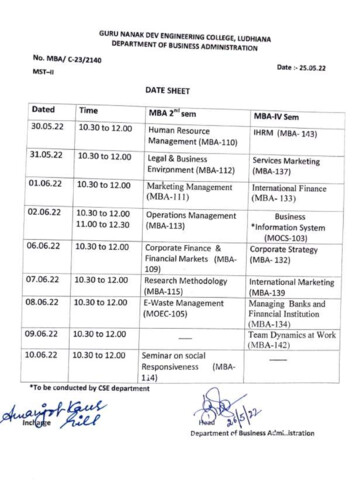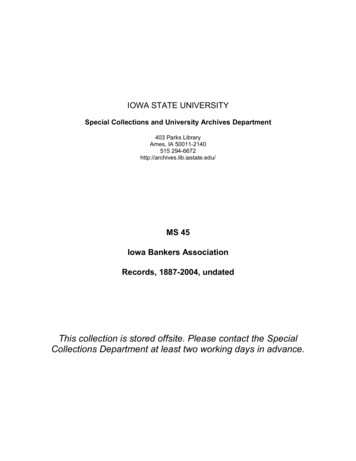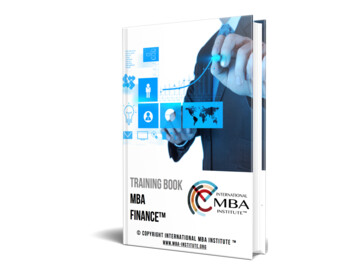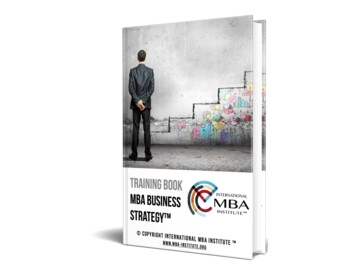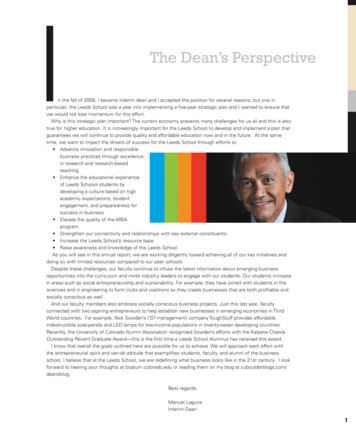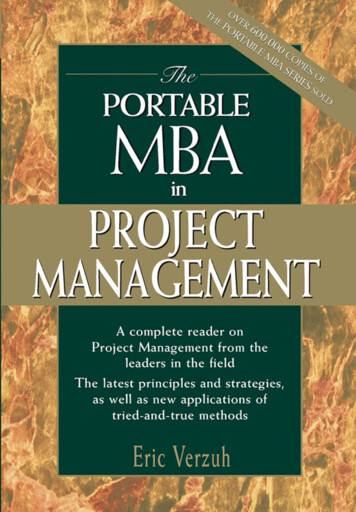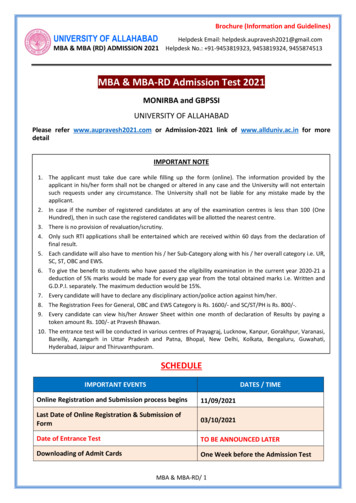
Transcription
MBA PROGRAMThe aim of the Master of Business Administration (MBA) program of IBA is to produce leaders and world-class managerswho are well-informed and well-equipped with technical, professional, theoretical and academic knowledge to lead theglobal organizations of the 21st century.IBA has both full-time and part-time MBA programs, which are professional graduate programs to develop skills andjudgment in individuals for effective management. The emphasis is on developing a student‘s ability to evaluate businessand organizational situations so that he/she is able to make informed and creative judgment about policy and operationalissues. Central to this approach is the development of creativity and reasoning in students, which is essential for everymanager regardless of function or level within an organization. A unique educational approach is taken to groom thegraduates who enter the institute from diverse academic backgrounds.The intended learning outcomes of the MBA program are as follows: Concrete and comprehensive understanding of business and business organizations Ability to manage people and understand organizational culture even in the global context Use of business analytics and other quantitative and qualitative techniques to make informed and prudent decisions Ability to formulate and implement strategy under resource, time and other constraints Ability to communicate in the language of senior management and utilize networking skills1.0 ADMISSIONThe rigorous and transparent admission process is one of the core strengths of IBA and is designed to select well-roundedindividuals with proven strength in academics, strong capability in written and oral communication, and high cognitivedevelopment. The Admission Test into the MBA program (both full-time and part-time) is held annually. Every applicantmust fulfill the eligibility requirements laid down by IBA. The eligibility and admission requirements are set annually bythe Academic Committee of IBA based on the local and global context.A foreign national who has met the above criteria and appeared for the GMAT Test and obtained a minimum 75 percentile maybe exempted from the written part of the admission test. However, this minimum qualifying score is set annually by theAcademic Committee of IBA.2.0 DEGREE REQUIREMENTSIn order to qualify for the MBA degree, a student has to meet the following requirements: Pass all 20 courses individually and maintain a minimum CGPA of 2.50 at the completion of the program; Pass the Internship with minimum ‗C ‘ grade; and, Complete the program in a maximum of 8 (eight) academic years from the date of admission.3.0CURRICULUM ADMINISTRATION3.1Course LoadFull -time StudentsA full- time student must register in 5 (five) courses in each semester. However, students may take 6 (six) courses in the finalsemester or in a semester if they need to repeat a course in order to clear a previously obtained ‗F‘ grade. This is allowedonly once during the entire program. In exceptional cases, course load may be relaxed, contingent on the approval of theAcademic Committee.Part- time StudentsA part-time student must register in 3 (three) courses in the first semester. From the second semester onwards a part-timestudent may take a minimum of 2 (two), but not more than 3 (three) courses per semester. However, students may take 4(four) courses in the final semester. In exceptional cases, course load may be relaxed, contingent on the approval of theAcademic Committee.3.2 Change of StatusA full-time student is eligible to switch to part-time only on the ground of full time job employment. In that case, s/he can applyto change status from second semester onwards by taking the same course load as that of a part-time student. Change of suchstatus will be allowed only if the student has minimum CGPA 2.50. However, s/he must submit valid evidence in support offull-time job placement. No part-time student can change status as full-time student.3.3Course Drop or AddCourse drop/add is allowed subject to taking minimum course load as specified in section 3.1 and within one week fromthe beginning of the semester. For exceptional cases, permission must be taken from the Academic Committee.2
3.4Transfer of Credit HoursTransfer of credit hours from foreign institution(s) having equivalent curricula, comparable grading system, and gradingstandards may be allowed for a maximum of 15 credit hours, provided that a student has obtained minimum ‗B ‘ grade inthe courses intended for transfer. Students seeking transfer must have had similar courses at the same level with at least80% identical content. Transfer of credit will be considered only after a student enrolls in the program having fulfilled alladmission requirements as applicable for regular students. All applications for transfer of credit will be considered by theIBA Equivalence Committee on a case-by-case basis. The Academic Committee will be the final authority to permittransfer of credit hours.A student who has been granted transfer of credits will be required to complete the remaining credit hours and meet otherdegree requirements of the MBA program. The transferred credits will not be part of the CGPA. A student, exempted froma course, may take an alternative course of the same level or higher, subject to the approval of the Equivalence Committeewithin two weeks from the beginning of the semester.3.5Course Waiver5 (five) foundation courses (equivalent to 15 credit hours) may be waived provided the student has obtained at least ‗B ‘grade(s) in similar course(s) (as specified by IBA Academic Committee) in the bachelors/masters level. However,graduates from institutes other than IBA, University of Dhaka must pass in an exemption test for each course to qualify forwaiver.3.6Semester(s) WithdrawalA student may apply for withdrawal from the semester after completion of at least one semester provided that s/he hasminimum CGPA of 2.50. Any student having ‗I‘ (Incomplete)/‘F‘ (Fail) grade will not be allowed to withdraw from thesemester(s). However, all students must complete the program within 8 (eight) academic years from the date of admission.Withdrawal from the semester is allowed within maximum 12 (twelve) weeks from the beginning of the semester. Anystudent not registered in any particular semester without taking withdrawal will be considered as discontinued andtherefore, dismissed from the program.3.7 Class AttendanceStudents are required to be present in all classes held during each semester. Only 3 (three) absences per course may beexcused. Absence in any more than 3 (three) classes without showing legitimate cause may result in strict disciplinaryaction and may even lead to an ‗F‘ grade in the concerned course.3.8 Probation and DismissalIn order to continue the program with good academic standing, students must maintain minimum CGPA 2.50 at the end ofeach semester. Obtaining CGPA of less than 2.00 shall result in dismissal from the program. If a student attains a CGPA of2.00 or more, but below 2.50 in a given semester, he/she will be placed on probation in the next semester. Failure to raisethe CGPA to at least 2.50 at the end of the probation semester will result in dismissal from the program.3.9 Unfair MeansStudents are strictly forbidden from adopting unfair means. The following shall be considered as adoption of unfair means: Communicating with fellow students for obtaining help, except in the case of collaborative work; Copying from another student's script, report, paper, etc. or helping another student to do the same; Copying from printed matter, hand-written script, writing on desk or palm of hand, or from other incriminatingdocuments during quizzes or examinations; Plagiarizing or copying from existing work without reference for inclusion in any submitted work; Possession of any incriminating document/mobile phone/electronic device including smart watches with storagecapacity, whether used or not; and, Any approach in direct or indirect form to influence a teacher concerning grades.Students adopting unfair means may be given an 'F' grade for the concerned assignment, test, quiz, term paper, report, oreven for the entire course, at the discretion of the instructor. In addition, adoption of unfair means and/or engaging in anybehavior, which disrupts the academic atmosphere and violates the tenet of respect towards other members of the institute,will be dealt with strictly. Disciplinary action may include dismissal of the student from the program as well as expulsionfrom IBA and as such, the University of Dhaka. Detailed consequences of such unfair means are outlined in a separate‗Handbook of Code of Conduct‘.4.0 PERFORMANCE EVALUATIONContinuous performance evaluation system is followed at IBA. Students are given continuous feedback throughout thesemester using various performance evaluation tools including class performance, quizzes, exams, assignments,presentations etc.3
4.1Grading SystemIn each course, students receive letter grades such as ‗A‘, ‗A-‘, ‗B ‘, ‗B‘, ‗B-‘, ‗C ‘, ‗C‘, ‗C-‘, ‗D ‘, ‗D‘, and ‗F‘,depending on their performances. 'F' is a failing grade. ‗I‘ stands for incomplete grade. Incomplete grade may be given incase any student is unable to complete certain criterion of grading due to some unavoidable circumstances (e.g. healthissues). ‗I‘ grades are always accompanied with an alternative grade. Students must contact concerned faculty members toclear ‗I‘ grades. All ‗I‘ grades must be replaced by other grades within 4 weeks of grade submission. In case noreplacement grade is submitted, the alternate grade initially submitted with ‗I‘ grade will be accepted. The numericalequivalence (grade point) of each grade, as used in calculating CGPA, is as follows:Letter GradesAGrade Points4.00Letter GradesCGrade Points2.00A-3.67C-1.67B 3.33D 1.33B3.00D1.00B-2.67F0.00C 2.33INA5.0 CURRICULUMThe variety of coursework in the MBA curriculum contributes to a broad based understanding of business managementprocesses. The pedagogy followed is a mix of case study and real life project based learning along with theoretical andconceptual knowledge. The students are required to work on projects or relevant case studies from the beginning of thesemester and relate theoretical knowledge with practical situations.5.1Course StructureCourse CategoryNo. of CoursesCredit Per CourseTotal 12Free Elective133Capstone133Internship (Non Credit)---Total605.1.1 Foundation CoursesThe MBA Foundation courses are designed to provide accelerated coverage of the knowledge and understanding necessaryfor students to prepare for the study of business at the graduate level.No.Course CodeCourse TitlePre-requisite Course Code1A501Financial Accounting-2C501Managerial Communication-3K501Quantitative Analysis for BusinessDecisions-4L501Legal Environment of Business-5W501Management of Organizations-5.1.2 Core CoursesThe core courses provide students with essential management skills to succeed in any career by focusing on the key areasrelating to any business organization.No. Course CodeCourse TitlePre-requisite Course Code1E501Managerial EconomicsK5012A502Managerial AccountingA50134F501H501Financial Theory and PracticeManaging People at Work4A501, K501W501
No.5Course CodeM501678W502K502P5019K503Course TitleMarketing Theory and PracticePre-requisite Course CodeW501Management Information SystemsBusiness AnalyticsManaging Operations and SupplyChainResearch MethodsW501K 501K501K5015.1.3 Areas of ConcentrationStudents concentrate on their chosen professional major, which prepares them for their desired careers in business andprovides specialized analytical skills for professional advancement. Students can choose one area of concentration fromamong 7 (seven) different areas. The concentration areas are: Accounting, Finance, Human Resource Management,Information Systems Management, Marketing, Operations and Supply Chain Management, and Sustainable Development.However, the Academic Committee of the Institute may introduce new major area/courses depending on demand fromindustry and in response to the changing business environment.A student must take minimum 4 (four) courses from his/her chosen area of concentration. The prerequisites for registrationin any of these major courses are successful completion of all foundation courses and major related core course(s) as set bythe Academic Committee. In general, the students will complete foundation courses before core courses and will completearea related core course(s) before taking any course from concentration area.The courses offered in different areas of concentration are listed below. The first 2 (two) courses (Course Code: 601 and602) from each concentration area are compulsory in order to pursue a major/concentration in that area. However, theAcademic Committee may decide to change this list of compulsory major courses from time to time.A) AccountingNo.123456Course ourse TitleIntermediate AccountingCost AccountingAuditing and AssuranceFinancial Statement AnalysisStrategic Management AccountingAdvanced Financial AccountingAccounting for Govt. and Non-Profit OrganizationsAccounting Theory and StandardsSocial and Environmental AccountingForensic AccountingB) FinanceNo.123456789101112NoF rse TitleCorporate FinanceInvestment Analysis and Portfolio ManagementFinancial Market and InstitutionsInternational Financial ManagementFinancial Statement Analysis and ValuationFinancial DerivativesMerger, Acquisition, and Private Equity ManagementFinancial EconometricsAlternative Investment AnalysisBehavioral FinanceVenture Capital and Entrepreneurial FinanceFinTech5
C) Human Resource ManagementNo.1234567891011Course CodeH 601H 602H 603H 604H 605H 606H 607H 608H 609H 610H611Course TitleLearning and DevelopmentPerformance ManagementCompensation ManagementHuman Resource PlanningLabor-Management RelationsNegotiation and Conflict ManagementStrategic Human Resource ManagementHR AnalyticsManagement of Change and DiversityTalent Management in the New EconomyLeadership For ExcellenceD) Information Systems ManagementNo.12345678910Course CodeK601K602K603K604K605K606K607K608K609K610Course TitleSystems Analysis and Design for ManagersE-Business in a Competitive EnvironmentInformation Management StrategyWeb Design, Development, and ManagementComputer ProgrammingManagement of Digital InnovationsInformation Systems in Managing ProjectsSecurity of Systems in Managing RisksE-CRMAdvanced Database Management SystemsCourse CodeM 601M 602M 603M 604M 605M 606M 607M 608M 609M 610M 611M612M613M614M615M616M617Course TitleBuyer BehaviorStrategic Brand ManagementIntegrated Marketing CommunicationServices MarketingB2B MarketingStrategic MarketingRelationship MarketingInternational MarketingInnovation and Product DevelopmentCross Cultural MarketingDigital MarketingAdvertisingSelling and SalesmanshipMarketing ResearchRetail ManagementPhysical Distributions and Value Chain ManagementMarketing AnalyticsE) MarketingNo.1234567891011121314151617F) Operations and Supply Chain ManagementNo.1Course CodeS60123456S602S603S604S605S606Course TitleLean Management, Total Quality, and Six SigmaStrategic Sourcing and ProcurementSupply Chain Strategy and ManagementGlobal Supply Chain LogisticsManaging Supply Chain ProjectsForecasting, Inventory Management and Supply Chain Analytics6
78S607S608Business Process Modeling and AnalysisStrategic Cost Analysis for Managers910S609S610Sustainable Supply Chain ManagementAnalytics in Operations ManagementG) Sustainable DevelopmentNo.1Course CodeD601Course TitleEconomics of Development234567D602D603D604D605D606D607Global Value Chain and Business CompetitivenessManagement of Small and Medium EnterpriseEntrepreneurship Development for Inclusive GrowthGlobalization, Technology and Sustainable DevelopmentSeminar in Market DevelopmentSocial Enterprise Management8910D608D609D610Policy Analysis for Sustainable DevelopmentPublic Finance and Good GovernanceManagement of Sustainable Development5.1.4 Free ElectiveStudents may undertake one free elective course from any area of concentration besides his/her chosen area ofconcentration. Alternatively, s/he can also undertake 5 (five) courses from area of concentration.5.1.5 Capstone CourseThis last semester course enables the students to integrate what has been learnt throughout the program. Students mustcomplete all Foundation and Core courses before taking this Capstone course in their last semester.Course CodeCourse TitlePrerequisite Course CodeW650Strategic ManagementAll foundation and core courses5.2 Internship ProgramThe primary objective of internship is to provide an on-the-job exposure to students and an opportunity for relatingtheoretical concepts to real-life situations. Students are placed in business enterprises, government and semi-autonomousinstitutions, NGOs, development projects, or research institutions. After successfully completing all the required courseworks, all students will have to complete internship program for MBA degree. This program serves as a mechanism for notonly assessing students‘ presentation skills, but also for determining how well they have integrated the conceptual learningfrom the MBA program with their experience of working in an actual organization.The internship program includes 8 (eight) weeks of organizational attachment and 2 (two) weeks for reflection reportwriting. However, part-time students with minimum 6-month full-time work experience may be exempted fromorganizational attachment. During the internship program, the student is assigned a supervisor from the institute who isresponsible to guide and supervise the student throughout the program. After submission of the report, the students have topresent the reflection report to the Defense Board. The defense board usually consists of the student supervisor and at leasttwo other faculty members of IBA. The reflection report is graded according to the grading scheme of IBA and the gradeearned in the internship is not used for calculation of the CGPA. However, the internship grade is reflected in the gradesheet.7
FOUNDATION COURSESA501 Financial AccountingThis basic accounting course is designed to equip the students with identifying, recording, interpreting, and communicatingthe financial information, and thereby using the information in decision-making. The course covers the basic accountingequation; double-entry system; recording process; preparation of financial statements; accounting for current assets (e.g.inventory and account receivables); depreciation methods; disposing and exchange of long term assets; internal control andbank reconciliation statement, and basic analytical techniques of financial statements. This course also covers theconceptual framework of financial reporting including objectives of financial reporting; quality of accounting information;assumption, principles and constraints of accounting practices and standards. Contemporary accounting software will alsobe introduced and taught in the course.C501 Managerial CommunicationThis course introduces interactive oral and interpersonal communication skills important to managers, including:presenting to a hostile audience, running meetings, listening, and contributing to group decision-making. Working inteams, students present a communication topic of their choosing to the class. An individual project challenges students toaddress a business audience in written and oral forms.K501 Quantitative Analysis for Business DecisionsThis course satisfies the background requirements for quantitative analysis and production management techniques. Thecourse will cover descriptive statistics, inferential statistics, and math models with business applications to analyzemanagement and organizational problems. Specific topics include methods for accessing and describing data, measures ofcentral tendency and variation, probability distributions, estimation, hypothesis testing, regression and correlation, decisiontheory, linear programming, transportation and assignment models.L501 Legal Environment of BusinessThe course includes the following topics of business law: law of contract – agreement, consideration, misrepresentation,void and voidable contracts; sale of goods – discharge, remedies; law of agencies; bailment and pledge; law of carriage ofgoods; negotiable instruments act; insurance law; company law; labor law – payment of wages, employment and nonemployment in factories, shops and establishments, workmen's compensation, industrial disputes, trade unions and CBA,labor courts.W501 Management of OrganizationsThe course is an amalgamation of Principles of Management and Organization Behavior. The course provides studentsopportunity to enhance their understanding of organizational operations and the people who work behind the wheels.Topics include basic functions of management, motivation; perception, values, attitudes; learning; discipline; defensivebehaviors; culture; group dynamics; line and staff management; organizational structure; organizational development;committee, departmentation; centralization and decentralization; bases of power etc.CORE COURSESE501 Managerial EconomicsThis course focuses on the economics of business decisions, making extensive use of cases. Topics include basic supplydemand theory and marginal analysis, the structure of decision problems, the impact of the market setting (i.e.,competitive, oligopolistic or monopolistic structures) and strategic interactions among firms using game theory. Theemphasis throughout is on the use of economic reasoning to solve actual business decision problems. The course alsoincludes computation of national income and product; aggregate supply and demand models; savings, consumption andinvestment; aggregate levels of production; theory of money and inflation; monetary and fiscal policy.A502 Managerial AccountingThe aim of this course is to provide an in-depth knowledge on managerial accounting principles and practices so thatmanagerial decision can be taken independently. This course will help student to: (1) identify relevant information formanagerial decisions; (2) analyze these information; and (3) finally, take appropriate decisions for implementation inpractice. The course deals with concept of cost element; cost classification; cost behavior; variable and absorption costing;job order and process costing; activity based costing; cost volume profit analysis; planning and budgeting; flexible budget;variance analysis; segment reporting; transfer pricing; and relevant cost items in decision making.F501 Financial Theory and PracticeThe objective of this course is to provide an overview of the financial management function. The content includesdiscussion about the different forms of ownership, appropriate goals of organizations, time value concept, securityvaluation techniques, financial planning and forecasting methods, and management of short-term resources, risk-returnconcepts, capital budgeting techniques, sources of finance, cost of capital, dividend policy and capital structure. Ethicalconsiderations and management in the global context are integrated into these topics. On completion of the course, students8
are expected to be able to see and evaluate the important activities of any organization from the financial managementpurview and appreciate the overarching cross-functional role of financial management.H501 Managing People at WorkWinning the war of talent will be the biggest challenge for managers around the globe in the upcoming decade. Locating,attracting, hiring and retaining the most suitable employees are most significant activities of managers. In this context,employees are sometimes referred to as human capital. As with other business assets, the goal is to make effective use ofemployees, reducing risk and maximizing return on investment. Students are introduced to the management of anorganization's workforce through the design and implementation of effective human resources policies and procedures.Topics include the need for human resources management and its growing professionalism; human resource planningincluding job design and analysis; recruitment and selection; compensation; employee development; workplace health andsafety; and employee relations.M 501 Marketing Theory and PracticeThe main objective of this course is to provide students a broad overview and understanding of the marketing function inan organization. The content includes defining marketing and its process, company and the marketing strategy, analysis ofmarketing environment, managing marketing information to get insights, consumer markets and business market and buyerbehavior in different markets, tapping into global market, the new customer path, industry archetype and best practices,developing customer driven marketing strategy, products, services and brands, addressing competition and driving growth,new product development and managing product life cycle (PLC), strategies in different stages of PLC, pricing strategies,managing marketing channels, retailing and wholesaling, integrated marketing communication (IMC), advertising, publicrelations, personal selling and sales promotion, direct, online and social media marketing, permission marketing, the powershift to connected consumers, the paradoxes of marketing to connected customers, the influential digital subscribers,creating competitive advantage, understanding global marketplace, sustainable marketing and social responsibility,managing a holistic marketing organization for the long run. Moreover, relevant case studies, recent event anddevelopment of marketing activities are integral part of this course.W502 Management Information SystemsThe course provides a foundation in the theory and practical application of information systems within an organization.This course is designed to enable students to assess the opportunities and problems that managers in organisations face asthey attempt to use these IT applications to add value to their businesses. Topics include Information Systems Conceptsand Terminology; Current Issues and Trends; E-Business and E-Commerce; Impact of Technology on Organizations;Managers and Users; Ethical, Social and Global Issues; Decision Support Systems; Executive Information Systems;Information Systems in Business Functional Areas of Marketing, Finance, Production and Human Resources; ProblemSolving Approach and Decision Making.K502 Business AnalyticsThis course is designed to aid the students in understanding what has happened in the past in a firm (descriptive analytics),using past data to predict what is going to happen in the future (predictive analytics), and helping to determine the bestcourse of action to take (prescriptive analytics). The contents of the course include: combining statistical modeling andcomputer techniques to help make principled decisions in the context of business, building computer-based statisticalmodels as aids in business problem solving, analyzing case studies using multiple regression, analysis of variance, timeseries forecasting methods, and survey sampling. Emphasis is placed on current computer-based statistical methods andbusiness applications.P501 Managing Operations and Supply ChainThis course is designed to prepare students for eventual participation as managers or specialists in the operations activity ofindustrial and service systems. The topics included in this course are strategic planning and optimized design of thelocation, transportation, and internal and external flows (Supply Chain Management and Demand Chain Management);models and methods of decision analysis in product development, sourcing and supplier strategies, outsourcing, strategicalliances, inventory management, and forecasting. Mathematical models for inventory optimization demand planning; andproject planning will also be introduced in this course.K503 Research MethodsThis core course presents an applied and directed overview of the research process, directly linked to the real life scenario.Every stage of the research process examines with an emphasis on presenting strategies to assist you meet the practical,epistemological and methodological challenges inherent in conducting research. The module covers orientation to currentapplied organizational research processes; basic, applied and business research; standards of assessment in businessresearch projects; recent trends of applied organizational research; research related technologies; and applied researchstatistics.9
AREA OF CONCENTRATION (MAJOR) COURSESA) ACCOUNTINGA601: Intermediate AccountingThis course begins with a rigorous review of the concepts, principles, measurements and accounting process, acquired inthe introductory level. This foundation is subsequently built upon on topic specific bases; accounting for current assets,current liabilities, non-current assets, intangible assets including impairment of non current assets, long term liabilities, andowner‘s equity, accounting for lease and accounting policies, changes and errors. This course also covers income andexpense recognition applications in diverse and complex business situations, implication in tax expense through differentaccounting practices. These topics are continuously incorporated into an increasingly complex accounting module with theculmination (preparation, presentation and disclosures) of the financial statements (Income Statement, Balance Sheet,Retained Earnings, and Statement of Cash Flows). The implication of the IFRS is discussed with each topic and itsapplication. The students will also be exposed practically to any accounting information system in order to provide themwith an understanding of how the accounting cycle works.A602: Cost AccountingThis is an ad
Pass all 20 courses individually and maintain a minimum CGPA of 2.50 at the completion of the program; Pass the Internship with minimum ‗C ' grade; and, Complete the program in a maximum of 8 (eight) academic years from the date of admission. 3.0 CURRICULUM ADMINISTRATION 3.1 Course Load Full -time Students

